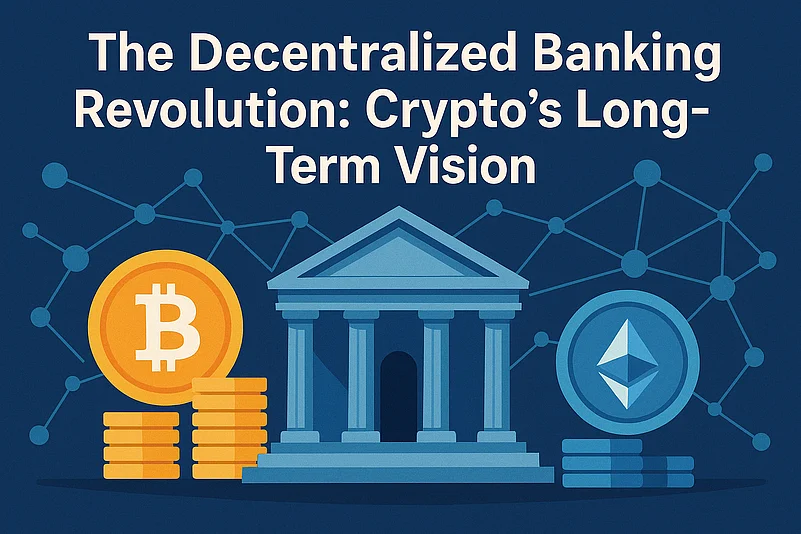Not very long ago, the idea of a world without traditional banks could have easily found its way into the realm of science fiction. Today, it is a stark reality under the name of decentralized finance, or DeFi. Cryptocurrencies are at the very heart of this revolution, a technology quietly redefining age-old notions of money, control, and trust. From the world's perspective, such technologies gain their media coverage in sudden bursts of excitement with price spiking or crashing. Underneath the noise lies the moaning of metamorphosis. This is the metamorphosis of blockchain and crypto, which hopes now to chart a path for decentralized banking systems that can affect everything.
Decentralized Trust - A Transition From Centralized Control
Traditional banking systems run on centralized models where money transfer, lending, and saving infrastructures are managed by some institutions. These act as gatekeepers and usually create friction through fees and delays, preventing entry of a number of systems, especially the 'unbanked' or 'underbanked' mass populations of the world.
This is what decentralized banking does-it upsets the entire apple cart of centralized banking. Rather than depending upon some central authority, individuals are now directly peer-to-peer viable via blockchain technologies. Such systems trust not in a bank but rather in mathematical security of cryptography and code, which record the transactions on publicly visible ledgers, achievable by independent nodes and made immutable-meaning unalterable and nonremovable.
From trusting institutions to trusting algorithms, it appears that we have made a really big leap on the way money can be moved, stored, or managed.
The Rise of DeFi
DeFi people, or decentralized finance, are the greatest thing for cryptocurrency. They are a bundle of financial constructs based on blockchain networks with the most popular ones being Ethereum, and which offer services such as lending, borrowing, trading, earning interest, etc. without intermediaries.
This means that a Nigerian can borrow a crypto loan using a digital or crypto asset without a bank giving any credit; there is no score to check to start the whole process. A rice farmer in a village in India can simply deposit his stablecoins in the liquid pool to earn interests like his own bank. Such immense accessibility gets to be a reckoning point where the formal banking systems are lacking or are rather exclusionary.
The way DeFi functions is with intelligent contracts that are codified to automatically execute actions in a government-driven manner using a blockchain. All is open-source; thus, anybody can verify how anything works within a protocol. This kind of openness would build trust where black-box banking systems could never hope to even come close.
Crypto Beyond Currency
When we talk about Bitcoin, most of the people think of it as digital gold but that is not the real essence of the larger crypto ecosystem. It is beyond currency, it is about the programmable financial layer-an internet of value.
Tokens may represent all forms of wealth-things like real estate or art, identity, reputation, or rights in voting. Projects are experimenting with decentralized autonomous organizations (DAOs), where the communities take collective decisions without any central leadership. Others are building decentralized insurance, prediction markets, and even credit scoring systems based on blockchain behavior instead of traditional data.
It resculptures the whole idea of finance and challenges the very assumptions of what is banking and who actually participates in it.
The Long-Term Vision: Inclusion, Autonomy, and Innovation
First, it will bring in inclusion. Crypto promises to democratize the playing field. Anyone having an internet connection together with a smartphone becomes a part of this. The effect is clearly felt in countries with both extremely fluctuating currencies and very scanty access to financial services.
Second, it gives autonomy to the user. Funds belong to individuals in non-custodial wallets, controlled solely by them, without having to involve a third party. This is totally unlike the existing system wherein banks freeze the accounts at will or limit some transactions.
And then last, it fosters very rapid innovation. The DeFi protocols are open-source, so developers are able to build new tools, combine them, and adapt quickly to the needs of users. Composability, however, has only led to an explosion of invented, financial applications-things that are simply impossible in the rigid, traditional banking framework.
Challenges Ahead
Security remains a key cause of concern. Smart contracts are considered as a powerful weapon, but they are not completely foolproof. Bugs cause malfunctions or may take a whole stolen amount as a loser through malicious attacks. Regulatory uncertainty, indeed, looms large. Many governments across the world are trying to figure out the path of classification, regulation, and continuation of how decentralized systems can be incorporated into the entirety of their law frameworks.
Also, there is a bit of a learning curve. Some private wallet management, knowledge about gas fees, and using DeFi platforms can be that intimidating to most. If the movement is going to achieve mass adoption, user experience and education need to go through some radical changes.
Conclusion: A Whispering Financial Revolution
This financial revolution is in its infancy. In the same way that the Internet brought information to the masses, Blockchain and Crypto wish to do the same concerning finance. It is not about taking down banks in a day but about thinking of a world where financial power is not concentrated, but distributed.
Decentralized banking is not just here today; it will be here tomorrow. The reasons for thrusting decentralized banking outside the confines of a trend include technology's capability, necessity of purpose, and vision for an open, equitable, and fair financial future."
Later it may not be a question whether crypto will change banking, but whether banks, in their current form, can change to suit an environment that no longer needs them.














